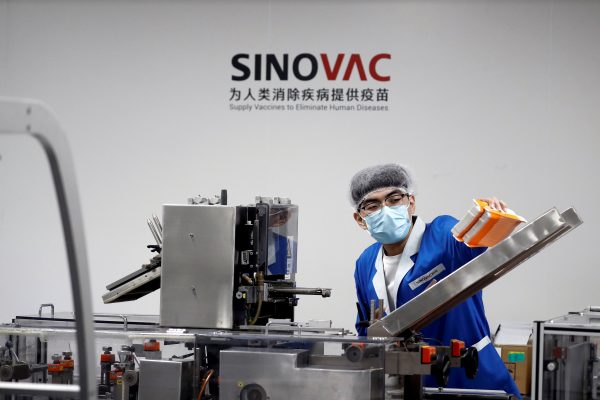For many countries around the world, last year was a blur and this year is essentially a question mark. What makes things somewhat different in the Philippines is the reign of tyranny and the culture of impunity that currently plague the nation. The pandemic has become a convenient excuse not only to lock down the country but also to crack down on media and legitimate dissent. As if these human rights violations are not enough, the government continues to be mired in corruption and scandal.
Philippine President Rodrigo Duterte is perceived globally as having ‘distinctly authoritarian tendencies’ in company with Donald Trump of the United States and Jair Bolsonaro of Brazil. Not surprisingly, the Office of the Prosecutor of the International Criminal Court finds ‘reasonable basis to believe’ that murder, torture and the infliction of serious physical injury and mental harm have been committed in the country.
Moody’s Analytics projects that due to ‘deep recession and uncertain fiscal support of policy makers’, the Philippines will be the last country in the Asia Pacific to recover from the COVID-19 recession, adding that the country also ‘lags in the [vaccine] procurement process’. This forecast may be wrong — the Philippines could even be the last to recover not just in the region but in the entire world.
The national government is defending its preference for the Chinese-made Sinovac vaccine while more than 30 provinces and cities have decided to deal with AstraZeneca as it is cheaper and has a higher efficacy rate. Nevertheless, the national government has made progress on procuring and administering COVID-19 vaccines but prioritised certain government officials and the Presidential Security Group (PSG). There were questions about the legality of having these ‘very important people’ vaccinated without approval from the Food and Drug Administration. The defence secretary justified the smuggling of vaccines, and Duterte even blocked the Senate’s plan to investigate the circumstances behind PSG vaccinations.
The Philippine government is also practicing double standards when it comes to implementing the law. There has not been much progress in the investigation into missing funds of the Philippine Health Insurance Corporation, amounting to 15 billion pesos (US$312 million). Government officials who violated mass gathering restrictions remain largely unpunished. A high-ranking police official who breached COVID-19 protocols in May 2020 became chief of the Philippine National Police (PNP) six months later.
Ironically, the PNP had no qualms arresting some people, including a former member of the House of Representatives, who engaged in relief and rehabilitation work during the lockdown. The same is true for those who joined mass actions, even if protesters observed health protocols like mask-wearing and physical distancing.
The media crackdown intensified during lockdown. ABS-CBN, a leading broadcast network largely critical of the Duterte administration, was shut down. Maria Ressa and Reynaldo Santos Jr of Rappler were convicted of cyber-libel. Lady Ann Salem, editor of Manila Today — a publication accused of being a communist front — was arrested and detained for illegal possession of firearms and explosives. The red-tagging of news media organisations like CNN Philippines, the AlterMidya network and media groups like the National Union of Journalists of the Philippines was relentless to the point where cases were filed against certain government officials.
Around the same time, the Duterte administration imposed the controversial anti-terrorism law, prompting various groups to file at least 37 petitions before the Supreme Court as the law infringes on numerous basic freedoms.
Tyranny and impunity are further manifested in ongoing extra-judicial killings. Peace consultant Randy Echanis was tortured and killed. Urban poor leader Carlito Badion met the same fate, along with Jory Porquia, a party-list group coordinator. Mary Rose Sancelan, a government doctor, was also shot and killed. They were all accused of being communists before they were killed.
Just like Lady Ann Salem, peasant organiser Amanda Echanis (daughter of Randy Echanis) was arrested and detained on trumped-up charges. Among the country’s political prisoners, Reina Mae Nasino’s case hogged the headlines in 2020 as she gave birth while in detention and was not allowed to go to the hospital when her baby became sick. When the baby died, she was further prevented from grieving properly due to the phalanx of police officers guarding her, not to mention the very limited time she was given to go to the wake and the cemetery.
While other countries focus on COVID-19 vaccinations, the Philippine government is currently preoccupied with changing the Constitution, reportedly for two reasons: first, to remove allegedly restrictive economic provisions; and second, to change the party-list system to disqualify certain party-list groups accused of being communist fronts. Of course, changing the Constitution could also be an opportunity for the powers that be to lift term limits.
Despite these tumultuous political developments, the death of the Philippine eagle Pag-asa should not be treated as an omen of despair. For this year and beyond, there remains hope as courageous Filipinos continue to struggle against adversity.
Danilo Araña Arao is Associate Professor at the University of the Philippines Diliman, Special Lecturer at the Polytechnic University of the Philippines, Associate Editor at Bulatlat Multimedia and Editor at Media Asia.
This article is part of an EAF special feature series on 2020 in review and the year ahead.

